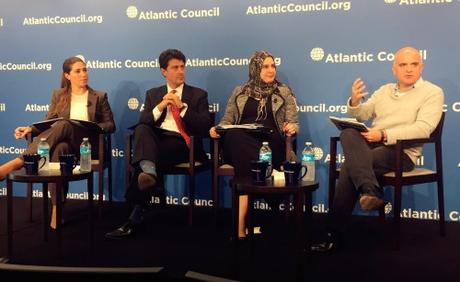
By Yini Wu
The refugee crisis in the Middle East is nothing new and it continues to evolve as new conflicts arise. Some host countries have been saturated with refugees over the years and have become especially sensitive when confronted with the current Syrian refugee crisis. To address these sensitivities, innovative insights and new approaches are needed to solve such a long-term crisis.
I attended a recent panel discussion on addressing the refugee crisis, where Matthew McGuire, U.S. Executive Director of the World Bank Group, Manal Omar, Associate Vice President of the Center for Middle East and North Africa of United States Institute of Peace, and Christopher Schroeder from the working group on economic recovery and revitalization for the Atlantic Council’s Middle East Strategy Task Force discussed how the World Bank, humanitarian communities, and the private sector can work together to support refugees and stabilize the Middle East.
Matthew McGuire first talked about the World Bank’s approach to the refugee crisis in the Middle East. The core of the World Bank’s approaches is economic development, especially among the host communities that are absorbing the refugees. The World Bank believes that a colossal refugee crisis like this requires a “systemic response” that involves financial support, global partners, and historical reference around the world. All active participants, including the governments, private sectors, and other institutions, should work together to promote community resilience.
McGuire suggested that the first step to dealing with the refugee crisis is conducting fundamental analytical research. All responses and decisions should be driven by data to avoid bias because sometimes the results can be counter-intuitive. For instance, some people believe that host countries should not make refugees feel “too comfortable” so as to insure they want to return to their home community. However, McGuire noted that refugees would only return to their home community when they have accumulated some money and feel confident about their situations. He further suggested that individuals keep this in mind when recommending policies to the host governments who are absorbing refugees.
Furthermore, the World Bank has been trying innovative approaches to addressing the refugee crisis such as creating new financial tools. Refugees are often in close quarters and it is imperative for these populations to stop the spread of infectious disease. In May 2016, the World Bank launched the Pandemic Emergency Financing Facility (PEF) to protect them from deadly pandemics. The PEF is an insurance product that is designed to release funds more quickly. In the event of a severe infectious disease outbreak, a quicker response could prevent the damage from spreading and accelerate the response.
Another new trend in resolving the refugee crisis in the growing level of technology available to refugees. Christopher Schroeder discussed the potential for technology in addressing the refugee crisis and how technology can not only enable refugees to receive assistance more quickly, but also ensure a much higher level of transparency and accountability of the solutions. He further explained that technology also changes the traditional, top-down solutions in which refugees are deemed as “problems to be solved.” Refugees can be empowered by technology and tools, and their capabilities are unleashed to solve the crisis from the bottom-up.
Manal Omar pointed out the importance of framing long-term strategies while investing in emergency solutions. For example, investing in women and youth is not only a humanitarian effort, but also a strategic long-term approach that leads to the sustainability of potential solutions. Today, refugee children have limited access to education and training. If this problem is not addressed, it is much more difficult for them to become productive members of the society when they grow up, regardless of if they are living in their home country or are still in a host country by that time. It is important to understand that we cannot afford to lose a generation of education. Refugee youth must be given with the necessary resources and tools to ensure brighter futures. As mentioned previously, technology can serve as an effective tool to address the refugee youth education challenge, and help refugee youth develop necessary skills despite the ongoing crisis.
The panel discussion addressed the common misconceptions on the refugee crisis and provided innovative approaches for supporting refugees, including creating new financial tools, tapping into the potentials of technology, and investing in women and youth. Also, all policy decisions should be made based on the results of fundamental analytical research and long-term strategic planning to avoid bias and remain sustainability.
Yini Wu is Communications Intern at CIPE.

